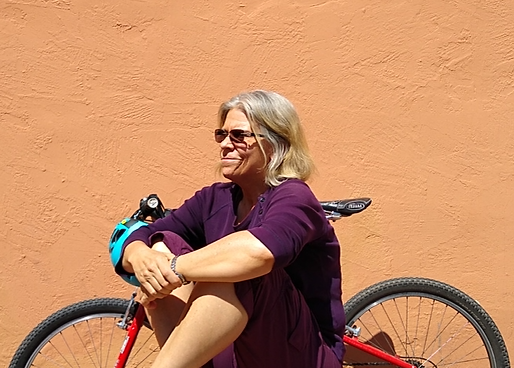Exploring Environmentalism through the World's Religions
Dr. Lora Stone Publishes Book, Religion and Environmentalism: Exploring the Issues
Categories: Faculty
April 14, 2020 - It took two years for Buddhist monks and a community tired of litter to build what is now the famous Wat Pa Maha Kaew—or Temple of a Million Bottles—complex in the Sisaket province of northeastern Thailand. First opened to the public in 1986, the temple is housed within a larger complex of 20 buildings constructed of over 1.5 million beer and other types of bottles along with mosaics created from bottle caps.
“The Buddhist monks view their commitment to sustainability and recycling as an expression of their religious beliefs and values,” explained Dr. Lora Stone, associate professor at the University of New Mexico – Gallup. “The monks also believe that their efforts encourage Thailand’s population to address pollution problems and practice environmental sustainability.”

In her new book, Religion and Environmentalism: Exploring the Issues, Dr. Stone explores religious traditions from around the world and their involvement in environmentalism to provide a global perspective and highlight the connections, similarities, and collaborations among all of the world’s different religious traditions.
From Buddhist monks constructing a temple out of litter and beer bottles, Pope Francis’ recent encyclical Laudato Si’: On Care for Our Home, and to the longstanding and sacred Islamic traditions of forest conservation, Dr. Stone takes the reader on a journey around the world to examine how religion impacts and drives environmentalism.
This book is also a personal endeavor for Dr. Stone, whose mother Linda sparked an early natural curiosity for the natural world, spirituality, and religious traditions. “She provided opportunities for many adventures in these fields that led to a deep appreciation of the many ways that humans interact with the natural environment. My interest has grown over the years and is inseparable from my being,” said Dr. Stone.
“When I was writing my PhD dissertation in the early 2000s, there was not much scholarship on the topic and many of the religiously motivated environmentalist organizations were just getting started or did not have a high public profile. So, I promised myself that I would revisit the topic at a later time with the intent of writing a descriptive, global overview of religiously and spiritually motivated environmentalism.”
This is certainly a timely topic as the world is impacted by a growing number of natural disasters caused or strengthened by global warming, and while many of the world religions are increasingly at the forefront of social and political environmental efforts. However, it was not always the case that the world’s religions were welcome partners in environmental movements—as many environmentalists once viewed religions as the root cause of the destruction of our natural environment.
“Many scholars and secular environmentalists in the 1960s were critical of religious institutions,” explained Dr. Stone. “In the late 1960s, the Judeo-Christian tradition specifically was criticized both for a purported role in the destruction of the natural world and for its beliefs in a divinely mandated human domination of nature.”
The first defenses of religion came later from North American Jewish scholars followed by responses from Christian scholars together contributing to a nascent religious environmental movement. “In addition to Jewish and Christian responses, by the 1980s Muslim philosophers and scholars were increasingly noting the shared values between Islam and modern environmentalism,” Dr. Stone said. “By the 1990s, all religions in the Abrahamic tradition were involved in a distinctly religious environmental movement that had roots in the contemporary secular environmental movement that emerged in the 1960s.”
Over the last few decades, this interplay between religious and secular environmentalism has improved the movement overall by increasing the number of organizations and networks dedicated to environmentalism. Activists, institutional leaders, and other members of diverse religious and spiritual traditions have worked to form organizations in the latter part of the last century and the first part of this 21st century that have embarked together upon decades of work to solve many of the planet’s most pressing environmental issues.
Some of the more notable organizations formed during this time include the Evangelical Environmental Network (EEN), which is a US-based Christian organization that advocates for political action and public policies that “honor God and protect the environment,” according to Dr. Stone. Or, the Alliance of Religions and Conservation (ARC) that operated from 1986 to 2019 and was founded by the president of the World Wildlife Fund, HRH Prince Philip, and other invited religious leaders from Buddhism, Christianity, Hinduism, Islam, and Judaism.
In the early part of this century, religiously and spiritually motivated groups also came together and began protesting fracking, including indigenous people, rural communities, and other adherents of nature religions. As explained by Dr. Stone, “Often these fracking protests are focused on local or regional risks experienced by communities that share religious or spiritual beliefs, rather than on fracking as a global issue.”
Whether the issue is global, regional, or local, there’s clear advantages brought to these causes from a religious environmentalism perspective. These movements can strongly benefit from religions, “since religious groups tend to have the experienced leaders, shared cultural elements, strong social relationships, and collective identities that help movements mobilize and achieve their goals,” said Dr. Stone. More so, religious organizations are comprised of enduring social relationships that can better facilitate political engagement.
“Increasingly, religions are addressing the environmental consequences of human activities that are involved in creating policies and initiatives that protect the natural environment. Around the world, religious traditions are involved in both collaborative and contentious politics—and often bring insight, enduring social networks, and experience to efforts aimed at resolving contemporary environmental issues and concerns,” said Dr. Stone.
To purchase and read Religion and Environmentalism: Exploring the Issues, search online for the following ISBN numbers (printing may be delayed by the emerging COVID-19 pandemic):
eBook:
Print Edition:
978-1-4408-6857-3
978-1-4408-6856-6
About Dr. Lora Stone:
Dr. Lora Stone is an associate professor at UNM Gallup in the Fine Arts, Humanities and Social Sciences Division, where she teaches sociology and political science. Dr. Stone’s field research includes working for the National Project on Community Development and Community Organizing, which involved data collection and analysis at selected sites across the United States to study the correlations between religious culture, socio-economic mobility, and political participation. Her research interests include social movements, community and workforce development, environmental sociology, astrosociology, and animals in society. She received a bachelor’s degree in English with honors from the University of Texas; a master’s degree in sociology from the University of New Mexico; and a doctoral degree with distinction in sociology from the University of New Mexico.

Latest News
UNM-Gallup hires new SBDC director
A year of burn demos, holiday food, and new courses
Zollinger Library January Events
UNM-Gallup makes progress on new Law Enforcement Academy
The University of New Mexico - Gallup
705 Gurley Ave.
Gallup, NM 87301
(505) 863-7500
Explore more News options:
UNM-G News UNM-G Events Speakers Bureau Press Release Archives


